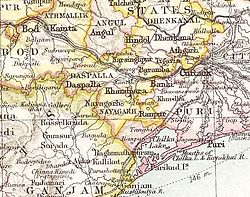History
Khandpara State is said to have been founded by Jadunath Singh Mangaraj, the youngest son of Raja Raghunath Singh of Nayagarh, who retained possession of four Garhs or forts, as his share, viz. Kadua, Ghuntasahi, Saradhapur, and Khedapada, which are located in Nayagarh region. Jadunath Singh is also said to have received the title Mangaraj from the Gajapati Maharaja. In the reign of Raja Narayan Singh Mangraj, Khandpara extended on the east up to Banki, on the west to Balaramprasad in Daspalla, on the north to Kantilo, and on the south up to Jogiapali. [2] [3] [4]
The last ruler signed the instrument of accession to the Indian Union on 1 January 1948, merging the former princely state into Odisha, forming a part of the Nayagarh district.
This page is based on this
Wikipedia article Text is available under the
CC BY-SA 4.0 license; additional terms may apply.
Images, videos and audio are available under their respective licenses.

